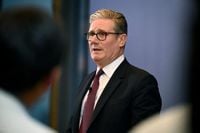In a scene that would have seemed unthinkable just months ago, world leaders gathered under the Egyptian sun on October 13, 2025, to witness the signing of a historic Gaza peace plan. The summit in Sharm el Sheikh, co-hosted by US President Donald Trump and Egypt’s President Abdel Fattah El-Sisi, marked the formal end of two years of devastating conflict between Israel and Hamas. The event drew more than 20 heads of state, including UK Prime Minister Sir Keir Starmer, all converging to bear witness to what many hope will be the dawn of a new era for the battered Gaza Strip.
The peace plan, a result of intense negotiations led by President Trump, was signed off by the US, Egypt, Qatar, and Turkey, with other Middle Eastern and European leaders in attendance. According to Sky News, Trump’s decisive push in the preceding week brought Israeli Prime Minister Benjamin Netanyahu and Hamas to the table, culminating in a 20-point ceasefire and reconstruction agreement. The ceasefire itself had been holding since Friday, October 10, providing a rare window of calm after years of violence.
"I’m very excited about this moment in time," President Trump told reporters before Air Force One departed for the region. He noted the outpouring of support from both Israeli and Arab communities, saying, "Everybody’s amazed and they’re thrilled and we’re going to have an amazing time." During his stop in Israel, Trump met with families of hostages and addressed the Israeli parliament, further underscoring the high stakes and personal toll of the conflict.
The first phase of the agreement was set in motion as the summit convened. On the morning of October 13, Israel confirmed that Hamas had released the first seven hostages to the Red Cross, part of a broader deal that would see the remaining 20 living hostages freed and the bodies of 28 others returned to their families. The war, which erupted on October 7, 2023, had left scars on both sides: about 1,200 Israelis killed, 250 taken hostage, and more than 67,000 Gazans dead, with the majority of Gaza’s two million residents displaced, according to Palestinian health officials and reporting from Sky News.
For many, the signing ceremony was a moment of relief and hope. But as Beth Rigby of Sky News cautioned, "this is only just the beginning of a long process to rebuild Gaza and try to secure a lasting peace in the region." The immediate priority, leaders agreed, is to get desperately needed aid into Gaza. The UK pledged £20 million for water, sanitation, and hygiene services, a move announced by Prime Minister Starmer at the summit. Foreign Secretary Yvette Cooper emphasized, "Gaza has been completely devastated. The ceasefire gives us the opportunity not just to urgently scale up humanitarian efforts but also to look to the future of Gaza’s recovery. Rubble must be cleared, infrastructure repaired, healthcare restored and homes rebuilt."
Yet the challenges ahead are formidable. The peace plan’s second phase involves rebuilding Gaza, establishing a terrorist-free zone, and setting up a temporary apolitical committee to govern the territory. Trump is slated to chair this governance committee, with former UK Prime Minister Tony Blair potentially joining a "Board of Peace" to supervise the process. According to The Independent, Trump acknowledged Blair’s experience but said, "I want to find out that he is an acceptable choice to everybody," reflecting sensitivities among Arab partners regarding international involvement.
Security arrangements are another complex piece of the puzzle. The 20-point plan envisions Israel maintaining an open-ended military presence along Gaza’s border, while an international stabilization force—composed mainly of troops from Arab and Muslim countries—will provide security inside Gaza. Israeli forces will continue to operate defensively from roughly half of Gaza, having pulled back to agreed-upon lines. Notably, there are no plans for British troops to participate in the multinational force, as confirmed by multiple UK sources.
Diplomatic dynamics have been delicate, with the UK government eager to play a constructive yet measured role. National security adviser Jonathan Powell has been in almost daily contact with Trump’s Middle East envoy Steve Witkoff, ensuring the UK’s input as the process advances. Back in London, the UK is hosting a three-day conference on Gaza’s recovery and reconstruction, while France and Germany are also convening regional partners to coordinate rebuilding efforts.
Still, the road to peace is fraught with political sensitivities. The UK’s desire for greater European representation on the Gaza governance committee is matched by Arab states’ insistence that any international figures involved must be broadly acceptable to all stakeholders. As one UK diplomatic source told Sky News, "While a lot of people in the Middle East acknowledge [Blair’s] experience, expertise and contact book, they don’t like him and we need—sooner rather than later—other names included that Gulf partners can get behind."
Political tensions flared on the eve of the summit when UK cabinet minister Bridget Phillipson suggested that Britain had played a "key role behind the scenes" in brokering the ceasefire. Her remarks were swiftly rebuked by US ambassador to Israel Mike Huckabee, who tweeted, "I assure you she is delusional... She can thank @realDonaldTrump anytime just to set the record straight." Israeli Deputy Foreign Minister Sharren Haskel also rejected the UK’s characterization of its role. The episode underscored the diplomatic tightrope that European leaders must walk as they seek to support US-led efforts without overplaying their hand.
For his part, Prime Minister Starmer was careful to praise Trump’s leadership, both publicly and in private conversations. "We stand determined to seize this opportunity to deliver a lasting peace and a stable, secure future for the whole region," Starmer said at the summit, according to The Independent. "Today is the first, crucial phase of ending this war and now we must deliver the second phase, in full. The UK will support the next stage of talks to ensure the full implementation of the peace plan, so that people on both sides can rebuild their lives in safety and security."
As the ink dried on the agreement in Sharm el Sheikh, the sense of accomplishment was tempered by an acute awareness of the work ahead. European leaders, while eager to help shape the next chapter, recognize that the US—and Trump personally—remains the linchpin of the process. As one UK official put it to Sky News, "There is lots of praise, rightly, for the US president, who got this over the line, but the big challenge for us post-war is implementing the plan. Clearly, Arab partners are concerned the US will lose focus."
With the guns silent, hostages returning home, and aid trucks poised to roll into Gaza, the world is watching to see whether this fragile peace can hold. The summit’s participants are acutely aware: the real test begins now.


